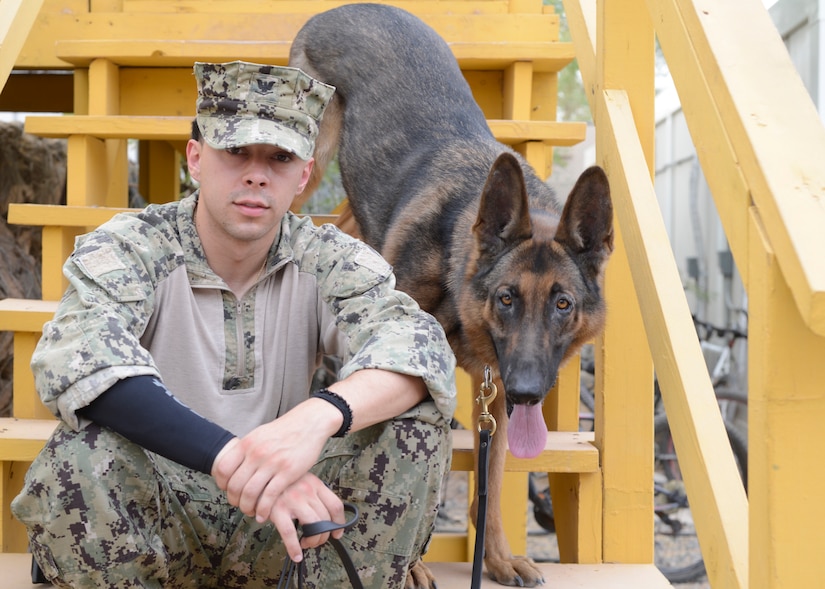By Navy Petty Officer 1st Class Joseph Rullo, Camp
Lemonnier, Djibouti
CAMP LEMONNIER, Djibouti -- In the sun-blasted, 100-degree
heat here, a military working dog is being held on a short leash. Rex, a German
shepherd, is a muscular 85 pounds and covered in thick, brown fur.
His partner and handler, Navy Petty Officer 3rd Class Jordan
Fuentes, a master-at-arms, barks out commands, but Rex’s wagging tail signals
that his mind is elsewhere.
An observer suggests that the humans take off their hats for
comfort.
“I wouldn’t do that,” Fuentes said.
Why? Does Rex become aggressive with the removal of hats? Is
it a signal to attack?
No. Rex loves to steal hats to play with, Fuentes said. Rex
likes to play with a lot of things. He looks for fun wherever he is -- and of
course does not know he has been diagnosed with cancer.
Rex, officially known as military working dog T-401, was
diagnosed while being treated for an ear infection.
“I noticed dry spots on his ears,” Fuentes said. “I waited a
little bit to mention it to the vet since I thought it was a reaction to the
medicine.”
Fuentes said that ear infections are common in military working
dogs that are deployed to desert areas because of the large amount of sand that
gets into their ears, which, in Rex’s case, are prominent.
Testing, Diagnosis
Rex was first examined in March by the Camp Lemonnier
veterinarian, Army Capt. Richard Blair. During a follow-up examination, Blair
noticed other skin lesions that raised additional concerns.
“We had to dig deeper to determine what was really going
on,” Blair said. Possible reason for the lesions included a reaction to the
medication, a skin infection, or even allergies.
While the facilities at Camp Lemonnier are appropriate for
the everyday care of working dogs, the base does have some limitations due to
its remote location, Blair said. So, he worked with other vets in the area of
operation to determine what caused the lesions.
“After some logistics challenges, we were able to get our
samples submitted to a pathology lab in Germany,” Blair said. “After a few
weeks, we got the results back.”
Fuentes said that he was working with Rex at the dog kennel
on base when his kennel master got the call from Blair.
“Cancer was the last thing I would have thought of,” Fuentes
said. “My heart sank when I heard the news.”
Getting Care, Beach Time
Rex has been a military working dog his entire life. He’s
been deployed several times, including two tours here.
His behavior has not changed since the diagnosis, Fuentes
said. He’s still a sweet dog who just wants to play tug of war.
Fuentes reached down and scratched Rex between his ears.
The bonds between service members can be strong. Serving in
a combat zone, working long hours, getting through stressful situations and
living together in small spaces has a way of making the bonds stronger.
Rex and Fuentes live together in a 7-by-20 container.
Fuentes joked that Rex likes to take up all of it.
“He’s obnoxious,” Fuentes said. “He’s all up in your
business, taking all of your space.”
The data on dogs with cancer is not as complete as it is on
humans with cancer, Blair said. As a result, Rex’s prognosis isn’t certain, but
getting him sent back to the U.S. is vital to his treatment.
At home, “he can get to more definitive care,” Blair said.
Rex will be redeployed in early August. His retirement
paperwork has also been started.
After retirement, Rex “won’t have to work and can enjoy the
rest of his life -- just chilling,” Fuentes said.
Fuentes is scheduled to redeploy with Rex and said he hopes
to adopt him -- but he isn’t the only person trying. A former handler is also
interested.
“It’s a race to the end to see who gets him,” Fuentes said.
Fuentes will be returning to Naval Air Station Lemoore,
California. Rex has never been to the beach, he said, and he’d like to take him
there.
Honorable Service
Navy Capt. Charles J. DeGilio, Camp Lemonnier’s commander,
presented Rex with a Navy and Marine Corps Commendation Medal at a ceremony
here July 27.
DeGilio said that military working dogs, including Rex, fill
an important role.
“Rex has served honorably to help keep the men and women of
Camp Lemonnier safe,” DeGilio said. “I want to personally thank him for his
service and wish him fair winds and following seas.”








No comments:
Post a Comment